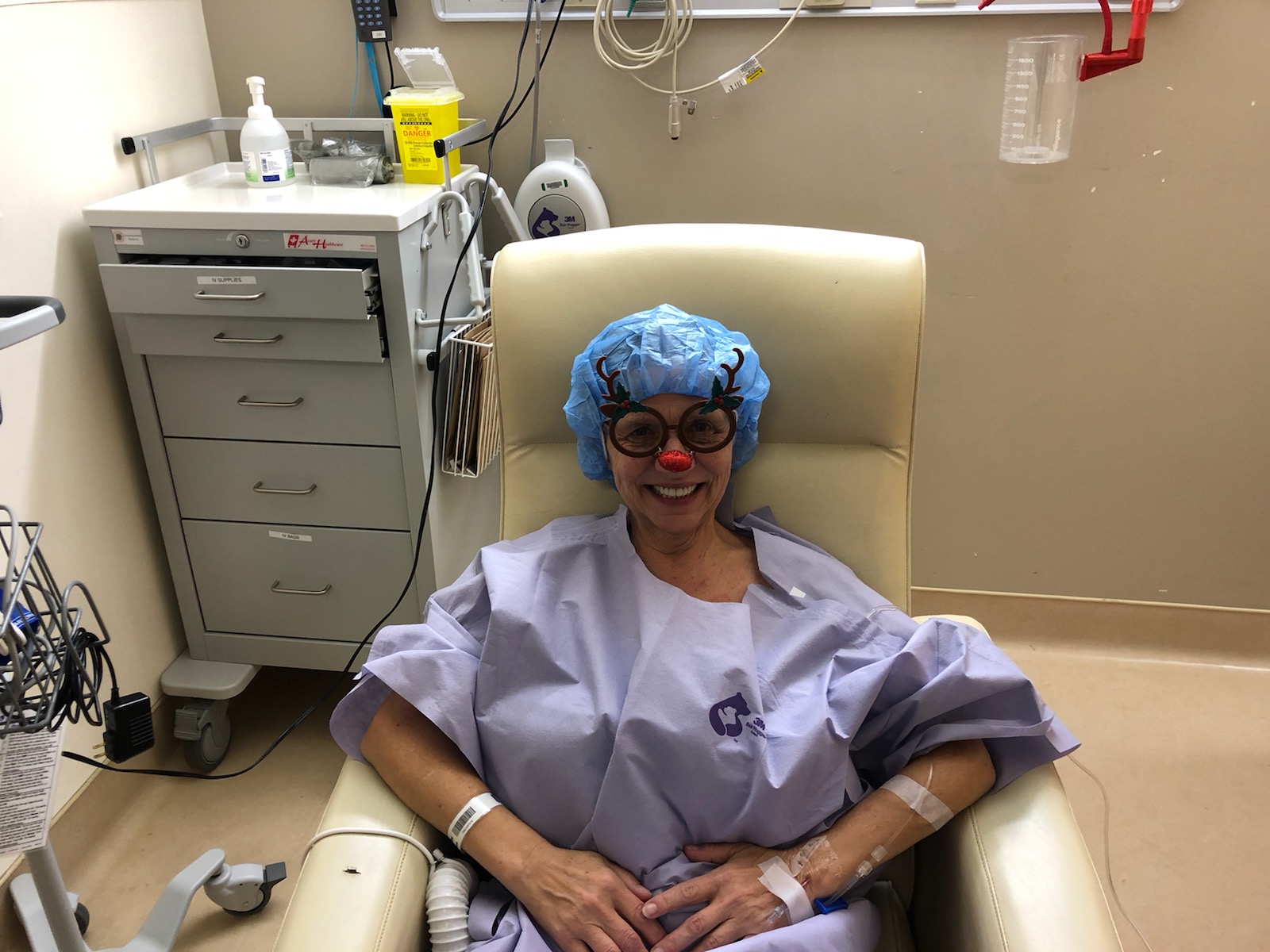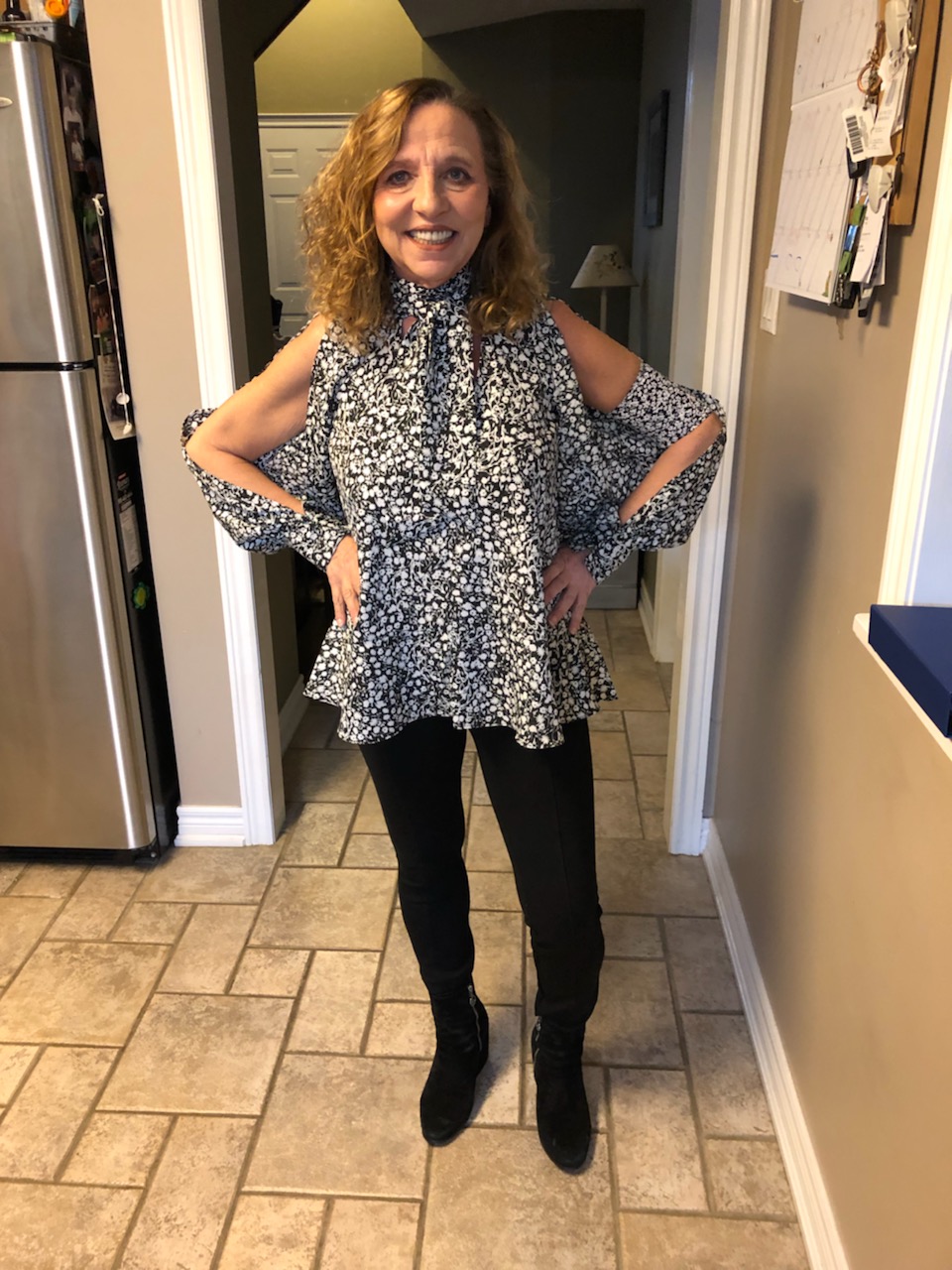For Sandy Robis, self-advocacy, exercise and staying positive are the secrets to survival.
Survivor Story: Sandy Robis
When Sandy Robis started experiencing pain between her shoulders and a constant itching all over her body just before the holidays in 2018, she had a suspicion of what the cause might be. Though she lost her mother to pancreatic cancer 30 years before, her awareness of the disease was about to save her life.
The next day Sandy went to see her doctor, where they discussed all of her symptoms: in addition to the back pain and itching, her urine was darker than usual, her stools had been fatty, and she’d also been eating smaller meals and experiencing fatigue, which at first, she attributed to getting older. “I thought I had pancreatitis,” she said. “While pancreatic cancer was in the back of my mind, the optimistic side of me said, ‘it can’t be that.’”
At first, Sandy’s doctor also thought it was hepatitis, and ordered lab work and an ultrasound. “When I was told I had to wait one week for an ultrasound, my response was ‘no’,” she said. “I immediately went online and searched for clinics in my area that did ultrasounds and the first place I called had a cancellation for the next morning.”

Sandy before surgery in December 2018.
The day after the ultrasound, a CT scan was scheduled which confirmed that there was a mass on the head of her pancreas. The potential diagnosis was pancreatic cancer. Fortunately, it was still operable.
Since it was so close to the holidays, her surgery was initially scheduled for the following month, but when an opportunity to have her Whipple surgery opened up a few days before Christmas she didn’t hesitate. “Given only 15-20% of people are even eligible for this surgery, I felt very fortunate to be able to have the Whipple [at all],” Sandy said. “[My surgeon and I] both agreed it had to be done ASAP.”
As she prepared for surgery, Sandy was determined keep her sense of humour and positive, outgoing attitude. “I [went] into the operating room with my Rudolph the Red Nosed Reindeer glasses on and a tin of homemade Skor shortbread for the OR staff!”
Sandy was also armed with her own personal experience: in addition to her mother’s experience with pancreatic cancer and a history of cancer within her family, Sandy had also beaten breast cancer seven years earlier. “I knew I could beat this too,” she said. “Pancreatic cancer is a devastating and complex diagnosis with limited treatment options and a very high recurrence and mortality rate. I’m only going to say that once, because I simply don’t look at those stats anymore. I prefer to focus on hope and sending ‘positive thoughts for negative results.’”
While Sandy was in surgery her doctors discovered cancerous lymph nodes, so her surgical team made the decision to remove her whole pancreas. A total pancreatectomy meant that she would have to take digestive enzymes with all meals and snacks and be insulin dependent for the rest of her life, but this decision ultimately saved her. She credits the experience of her surgical team for making the best decision for her future health. “I can’t stress the importance of having your surgery done by someone who has done hundreds of Whipples…at a facility that specializes in pancreatic cancer.”
The pathology report indicated stage III pancreatic cancer so six weeks after surgery, Sandy started her first of 12 rounds of Folfirinox, which is a particularly powerful, toxic form of chemotherapy. “My oncologist said to me, ‘Sandy, to get through this very strong protocol you have to eat’ and eat I did. What also helped was having IV hydration for three days after each infusion.”
Sandy finished her chemotherapy regimen in July of 2019 and says she still feels great. She managed to gain all her weight back even during chemo and is back to her “fighting weight”. She attributes much of her recovery and wellbeing now to staying active throughout her treatment. “Exercise is very important – if you can’t do anything else, just keep walking,” she said. Even when she was still in the hospital recovering from surgery, she was determined to move around. “I would walk around my bed. I walked all over the hospital by myself, and with family and friends for my remaining time in the ward. [After I was released], I went to a facility that caters to cancer patients: they customize an exercise program based on your diagnosis and limitations.”
Over a year after her diagnosis she is now cancer free and still living her life in a positive, outgoing way. This past October she even hosted a Halloween party where she dressed up as US Supreme Court Justice Ruth Bader Ginsberg. “[Ruth Bader Ginsberg] has survived cancer four times – she’s my hero!”
Sandy’s survival has not been without challenges though. As a result of her full pancreatectomy, she now lives with Type 3c diabetes, which she said is “an extremely brittle and hard to manage” form of the disease. She has to watch her diet very carefully, keeping carb intake low and taking the appropriate insulin. She also experiences neuropathy in her fingers and toes, a side effect of the chemo that is slowly subsiding. Otherwise, from this point forward she and her medical team are monitoring her health with regular tests.
In June of 2018, just six months before her diagnosis, Sandy had started early retirement after 25 years in the IT sector. Now she has a new passion after her experience with pancreatic cancer: advocacy and support. “I feel so blessed to have had the drive and tenacity to advocate for myself,” she said. “I now think I found my purpose in life: to help advocate for others.” Through online forums, social media and peer support groups, she now dedicates her time to looking out for those who need encouragement and resources to achieve the best possible outcomes in their fight against pancreatic cancer. In fact, when her surgeon was about to release a fellow Whipple Warrior patient from the hospital, he called Sandy to help her through this journey. From this experience a new friendship has developed, filled with hope and optimism.

Sandy on her 61st birthday.
When asked how best to advocate for yourself as a pancreatic cancer patient, Sandy has five tips she likes to share:
- Knowledge is power. “Educate yourself on your illness and treatment options – and I don’t mean ‘Doctor Google’. Use reputable evidence-based, peer reviewed medical sources. Ask as many questions of your medical team as you need – nobody knows your body like you do, so if you feel something odd is going on contact your doctor.”
- It takes a village. “Surround yourself with loving family, friends and like-minded people, and reach out those who are going through the same experience you are. I joined several online support groups [as well as] the local Diabetes Canada support group that meets monthly. As much as I learn from others, I find I can also provide lots of insight and positivity back.”
- Be the quarterback. “There are various people on your team – surgeons, oncologists, endocrinologists, general practitioners, naturopaths, dietitians, pharmacists, genetic counselors, home care specialists – and sometimes they don’t all talk to each other or can have conflicting recommendations,” she said. Sometimes you have to do some of the work to break down the silos within your healthcare team.
- Don’t take ‘no’ for an answer. “Self-advocacy is critical – the squeaky wheel does get the grease. Nobody knows your body like you do. So, speak up, and if you are not happy with one of your medical professionals, get a second opinion – it is your right!”
- Positivity is key. “I can’t stress this enough. You will have ups and downs – just take baby steps. Every day is a victory, so be kind and patient with yourself. Embrace the help from others and ‘NEGU’ – Never Ever Give Up!”
